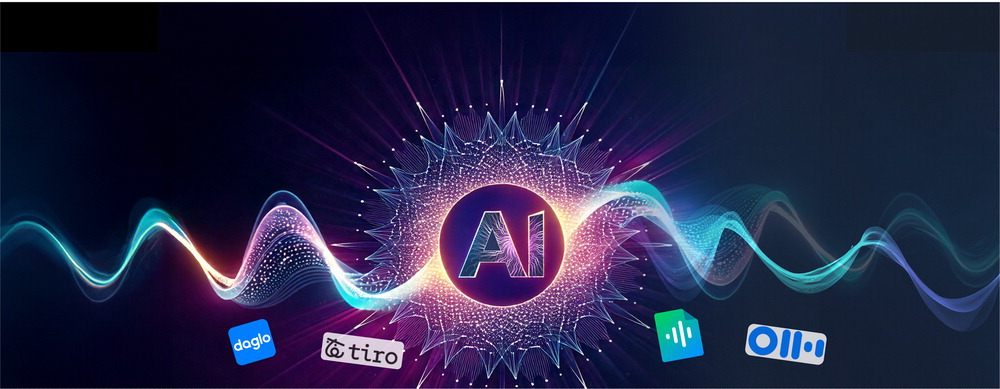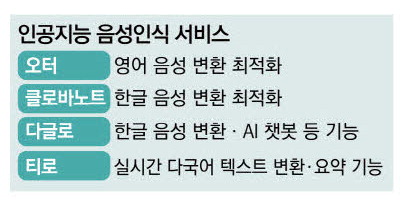
While the U.S. "Otter" has taken an unrivaled position in the global market, Korean companies with technology such as Action Power's "Daglo," The Playto's "Tiro," and Naver's "Clova Note" have also entered the competition. In particular, startups such as Daglo and Tiro are captivating customers by releasing various functions that provide convenience when used based on strong voice recognition technology.
A simple experiment was conducted to compare the performance of each application. It is a method of placing a laptop in a conference room where appropriate noise is generated, operating each app, and playing 5-10 minutes of YouTube videos that include Korean, English, and dialect (Korean) conversations. The experiment used videos such as a famous speech by U.S. President John F. Kennedy in 1962, "We chose to go to the moon," and an episode of the U.S. TV series "Shark Tank," in which several people appear to announce business models and decide whether to invest.
All four apps had excellent ability to convert the language in the video into text. Daglo, Tiro, and Otter came to the exact same conclusion that artificial intelligence (AI) provides a summary of the contents based on scripts (Clova Note only supports Korean). After listening to a video of a shark tank in which several people appear and talk, we summarized what business models they describe, what investors' opinions are, and whether they receive investment. There was no significant difference when the video was played at 1.2 times the speed. Daglo and Tiro translated the English script into Korean and even provided a summary of the points.
To name a difference, Otter distinguished the number of speakers (five) appearing in the Shark Tank as it specialized in English. Daglo accurately distinguished speakers in Korean videos featuring more than three people, although there were differences in speaker distinction in English videos.

Otter, Daglo, and Clovanote saved the voice as a file, and when they clicked on the script, they played the part again, which would be quite useful for revisiting meetings or lectures.
Tiro refines text based on AI. For example, when recording a Korean lecture explaining 'LLM', Clova Note and Daglo sometimes recognized it as a different language, and Tiro unifies and organizes all voices such as LLM or 'Large Language Model' and 'Giant Language Model' in the video. It also showed strength in converting octopus into colloquial.
As a result, Tiro's recognition ability was slightly lower when he spoke dialect, but Daglo and Clovanot were able to confirm the result of converting the voice into text and changing it to a level that could be roughly understood.
The strength of Daglo and Tiro is that it provides multiple functions based on high-quality speech recognition technology. In particular, Daglo provided a function to convert and organize the voice of the video into text just by entering a YouTube address. I put in a 15-30-minute YouTube video address containing "Quantum Mechanics Lecture" and "History of NVIDIA," and it organizes the video content into text so that it can be summarized neatly.
The "Chatbot" in Daglo also provides users with the ability to ask and answer AI based on the dictation content converted from Daglo. As these convenience features captivated customers, Daglo has secured 1.5 million subscribers, the largest number of subscribers among domestic voice recognition apps. Cho Hong-sik, CEO of Action Power, explained, "Daglo subdivides templates into 22 types, including meetings, interviews, and sales meetings, and organizes dictation results in a form suitable for the purpose." Daglo paid members can also use paid chat services without restrictions, such as GPT4o, Claude Sonet, and Purple Lexity, which can be used by paying a subscription fee of 30,000 won per month.
Tiro's strength is that it not only shows the process of converting speech into text in real time, but also summarizes it at the end of a paragraph. In other words, you can check what kind of conversations happened when you came back after you were away for a while while recording a meeting or lecture. It is expected that it will be useful in meetings with foreigners as it quickly changes foreign languages to Korean.
Lim Eun-sung, CEO of The Playto, said, "Tiro is providing real-time voice recognition service for the first time in Korea. It is also differentiated by being able to ask questions about conversation records like Purple Lexy." Tiro exceeded 10,500 cumulative subscribers in March, and the subscription renewal rate exceeded 90%. Through the experiment, it was possible to directly check the technological development of the recently released voice recognition apps. Major apps such as Otter, Clovanote, Daglo, and Tiro all provide 300 to 600 minutes free of charge when you sign up, so if you're thinking about using a voice recognition app, you'd better try it yourself and choose one that suits you.
[Reporter Won Hoseob]














